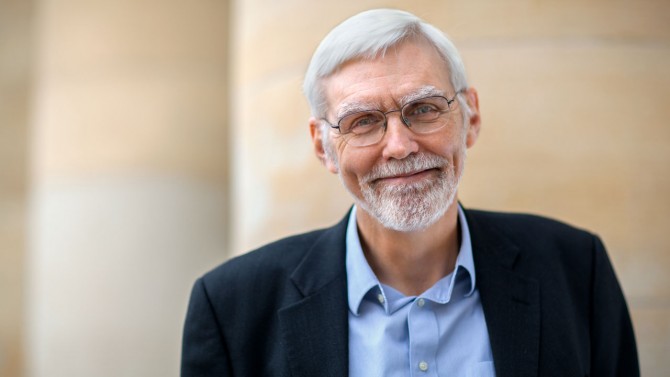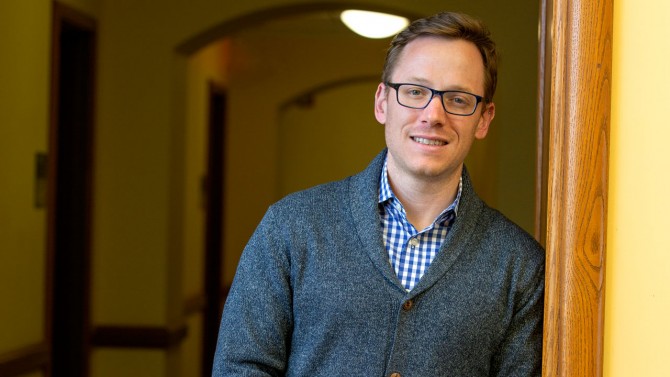Lepage, Pepinsky honored with Tisch professorships
By Daniel Aloi
G. Peter Lepage, the Goldwin Smith Professor of Physics, and Thomas Pepinsky, professor of government, both in the College of Arts and Sciences, have received two of Cornell’s highest honors for faculty members.
Lepage has been named to the Andrew H. and James S. Tisch Distinguished Professorship, which recognizes excellence in teaching and extends the undergraduate teaching role beyond retirement.
Pepinksy has been named a Tisch University Professor, which honors current faculty and allows the university to attract and retain prominent scholars and midcareer faculty members.
“Research and teaching are the heart of the university, and the Tisch professorships exemplify our commitment to support the recruitment and retention of our most distinguished faculty members,” Provost Michael Kotlikoff said. “Professors Lepage and Pepinsky are exemplary scholars, teachers and leaders; they embody Cornell’s academic excellence and the talent and skill of those we continue to attract to Cornell.”
Andrew H. Tisch ’71 and James S. Tisch ’75 established the Tisch Distinguished Professorship in 2002 as a vehicle to keep excellent teachers in the classroom. Held by only one professor at a time, it is awarded to a senior faculty member who is noted as a leader in his or her academic field, an individual who has influenced his or her students’ thinking, values and understanding of the world, and who is considering retirement or has retired.
Lepage, who began phased retirement in 2019 and will fully retire in 2024, joined the Department of Physics in 1980 and has spent his entire professional career at Cornell. He became a full professor in 1990 and chaired the department from 1999 to 2003.
In his tenure as the Harold Tanner Dean of the College of Arts and Sciences from 2003-2013, he oversaw the hiring of more than one-third of the college’s faculty, including strategic hires in the humanities, social sciences and natural sciences.
Lepage’s research program in quantum physics develops numerical simulation techniques critical to the study of quantum chromodynamics – the fundamental theory of quarks and gluons that describes the internal structure of protons, neutrons and other subnuclear particles. He received the American Physical Society’s J.J. Sakurai Prize in 2016 for inventive applications of quantum field theory to particle physics.
“Professor Lepage has been instrumental in the development, application, and – importantly – the rigorous assessment of innovative approaches to STEM education,” Ray Jayawardhana, the Harold Tanner Dean of the College of Arts of Sciences, wrote in his nomination letter.
Lepage was appointed in 2012 by President Barack Obama to the National Science Board, the governing body of the National Science Foundation. Lepage also co-chaired a study on postsecondary science education for the President’s Council of Advisors in Science and Technology, and served on the Technical Advisory Committee for the Association of American Universities’ Undergraduate STEM Education Initiative.
He has applied his national experience to university service – as director of education innovation in the College of Arts and Sciences from 2015-18 and as the current director of the Active Learning Initiative, which originated in the college and has since expanded universitywide.
“In this capacity, he has spearheaded new approaches to facilitate superior teaching and learning in some of the most vexing of environments – large, introductory STEM classes,” Jayawardhana wrote. The initiative now encompasses courses across several disciplines “and has built a community of like-minded faculty keenly focused on undergraduate teaching and learning.”
Lepage earned his B.Sc. degree from McGill University, his master’s from Cambridge University and his Ph.D. in physics from Stanford University. He received a John Simon Guggenheim Fellowship in 1996-97 and an Alfred P. Sloan Fellowship in 1990, and was elected to the American Academy of Arts and Sciences in 2008.
Pepinsky joined the Department of Government in 2008 and was named a full professor in 2019. He studies the interaction of political and economic systems, mostly in emerging market economies, and is an internationally recognized scholar with expertise in local, national, regional and global political economy; religion, ethnicity and identity; and Southeast Asian studies.
Colleagues have referred to Pepinksy as a thought leader. “He has been unflaggingly prolific since he joined Cornell, along every axis – research, teaching and service,” Jayawardhana wrote. “He is also a highly visible and broadly engaged scholar on the national stage.”
Pepinsky is a faculty affiliate of the Southeast Asia Program at Cornell, and serves as its interim director. He is associate director of the Cornell Modern Indonesia Project and is a nonresident senior fellow in the Brookings Institution’s Foreign Policy Program. He also chaired the Arts and Sciences Curriculum Review Committee.
He co-founded the Southeast Asia Research Group and is past president of the American Institute for Indonesian Studies. He also serves on the board of directors of the Association for Analytical Learning about Islam and Muslim Societies, and as treasurer of the American Political Science Association.
Pepinsky’s books include “Economic Crises and the Breakdown of Authoritarian Regimes: Indonesia and Malaysia in Comparative Perspective” (2009); and (as co-author or co-editor) “Beyond Oligarchy: Wealth, Power, and Contemporary Indonesian Politics” (Cornell University Press, 2014) and “Piety and Public Opinion: Understanding Indonesian Islam” (2018).
He earned his bachelor’s degree in linguistics and international relations from Brown University in 2001, and his doctorate in political science from Yale University in 2007.
Media Contact
Get Cornell news delivered right to your inbox.
Subscribe


